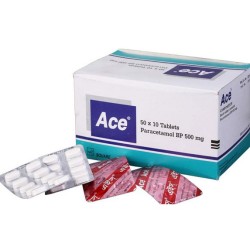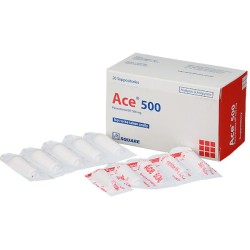Ciprocin 500mg tablet 10's strip

Ciprocin 500mg tablet 10's strip
৳ 40.27/=
Ex Tax: ৳ 40.27/=
- Stock: In Stock
- Model: MEDI-00145
- Generic: Ciprofloxacin
- Pack Size: Each strip contains 10 tablets of Ciprofloxacin 500mg
0 items sold
6039 views
Available Options
Indications
Ciprofloxacin is indicated for the treatment of infections caused by susceptible isolates of the designated microorganisms in the conditions and patient populations listed below.
Uncomplicated Urinary Tract Infections (Acute Cystitis): Ciprofloxacin is indicated for the treatment of uncomplicated urinary tract infections (UTIs) caused by Escherichia coli, Proteus mirabilis, Enterococcus faecalis, or Staphylococcus saprophyticus.
Because fluoroquinolones, including Ciprofloxacin, have been associated with serious adverse reactions and for some patients uncomplicated UTI (acute cystitis) is self-limiting, reserve Ciprofloxacin for treatment of uncomplicated UTIs (acute cystitis) in patients who have no alternative treatment options.
Complicated Urinary Tract Infections, And Acute Uncomplicated Pyelonephritis: Ciprofloxacin is indicated for the treatment of complicated urinary tract infections (cUTI) caused by Escherichia coli, Klebsiella pneumoniae, Enterococcus faecalis, Proteus mirabilis, or Pseudomonas aeruginosa and acute uncomplicated pyelonephritis(AUP) caused by Escherichia coli.
To reduce the development of drug-resistant bacteria and maintain the effectiveness of Ciprofloxacin and other antibacterialdrugs, Ciprofloxacin should be used only to treat infections that are proven or strongly suspected to be caused by susceptible bacteria. When culture and susceptibility information are available, they should be considered in selecting or modifying antibacterial therapy. In the absence of such data, local epidemiology and susceptibility patterns may contribute to the empiric selection of therapy.
Appropriate culture and susceptibility tests should be performed before treatment in order to isolate and identify organisms causing infection and to determine their susceptibility to ciprofloxacin. Therapy with Ciprofloxacin may be initiated before results of these tests are known; once results become available appropriate therapy should be continued.
As with other drugs, some isolates of Pseudomonas aeruginosa may develop resistance fairly rapidly during treatment with ciprofloxacin. Culture and susceptibility testing performed periodically during therapy will provide information not only on the therapeutic effect of the antimicrobial agent but also on the possible emergence of bacterial resistance.
Uncomplicated Urinary Tract Infections (Acute Cystitis): Ciprofloxacin is indicated for the treatment of uncomplicated urinary tract infections (UTIs) caused by Escherichia coli, Proteus mirabilis, Enterococcus faecalis, or Staphylococcus saprophyticus.
Because fluoroquinolones, including Ciprofloxacin, have been associated with serious adverse reactions and for some patients uncomplicated UTI (acute cystitis) is self-limiting, reserve Ciprofloxacin for treatment of uncomplicated UTIs (acute cystitis) in patients who have no alternative treatment options.
Complicated Urinary Tract Infections, And Acute Uncomplicated Pyelonephritis: Ciprofloxacin is indicated for the treatment of complicated urinary tract infections (cUTI) caused by Escherichia coli, Klebsiella pneumoniae, Enterococcus faecalis, Proteus mirabilis, or Pseudomonas aeruginosa and acute uncomplicated pyelonephritis(AUP) caused by Escherichia coli.
To reduce the development of drug-resistant bacteria and maintain the effectiveness of Ciprofloxacin and other antibacterialdrugs, Ciprofloxacin should be used only to treat infections that are proven or strongly suspected to be caused by susceptible bacteria. When culture and susceptibility information are available, they should be considered in selecting or modifying antibacterial therapy. In the absence of such data, local epidemiology and susceptibility patterns may contribute to the empiric selection of therapy.
Appropriate culture and susceptibility tests should be performed before treatment in order to isolate and identify organisms causing infection and to determine their susceptibility to ciprofloxacin. Therapy with Ciprofloxacin may be initiated before results of these tests are known; once results become available appropriate therapy should be continued.
As with other drugs, some isolates of Pseudomonas aeruginosa may develop resistance fairly rapidly during treatment with ciprofloxacin. Culture and susceptibility testing performed periodically during therapy will provide information not only on the therapeutic effect of the antimicrobial agent but also on the possible emergence of bacterial resistance.
Therapeutic Class
4-Quinolone preparations,
Anti-diarrhoeal Antimicrobial drugs
Pharmacology
Ciprofloxacin is a synthetic broad-spectrum antimicrobial agent for intravenous administration. The bactericidal action of Ciprofloxacin results from inhibition of the enzymes topoisomerase II (DNA gyrase) and topoisomerase IV, which are required for bacterial DNA replication, transcription, repair, and recombination.
Dosage & Administration
Adult Dose (Oral):
Urinary Tract infection:- Acute uncomplicated: 250 mg twice daily for 3 days; Mild/Moderate: 250 mg twice daily for 7 to 14 days;
- Severe/Complicated: 500 mg twice daily for 7 to 14 days;
Lower Respiratory Tract infection:
- Mild/Moderate: 500 mg twice daily for 7 to 14 days,
- Severe/Complicated: 750 mg twice daily for 7 to 14 days;
Skin and Skin Structure infection:
- Mild/Moderate: 500 mg twice daily for 7 to 14 days,
- Severe/Complicated: 750 mg twice daily for 7 to 14 days,
- Mild/Moderate: 500 mg twice daily for 4 to 6 weeks,
- Severe/Complicated: 750 mg twice daily for 4 to 6 weeks,
Infectious Diarrhea: Mild/Moderate/Severe: 500 mg twice daily for 5 to 7 days,
Typhoid Fever: 500 mg twice daily for 10 days,
Urethral & Cervical Gonococcal Infections: Uncomplicated: 250 mg Single dose.
For IV infusion:
Urinary Tract Infection: - Mild to Moderate: 200 mg 12 hourly for 7-14 days;
- Severe or Complicated: 400 mg 12 hourly for 7-14 days;
- Mild to Moderate: 400 mg 12 hourly for 7-14 days;
- Severe or Complicated: 400 mg 8 hourly for 7-14 days;
Skin and Skin Structure:
- Mild to Moderate: 400 mg 12 hourly for 7-14 days;
- Severe or Complicated: 400 mg 8 hourly for 7-14 days;
- Mild to Moderate: 400 mg 12 hourly for more than 4-6 weeks;
- Severe/Comlicated: 400 mg 8 hourly for more than 4-6weeks;
Acute Sinusitis: Mild/Moderate: 400 mg 12 hourly for 10 days:
Chronic Bacterial Prostatitis: Mild/Moderate: 400 mg 12 hourly for 28 Days.
Children and adolescents:
RTI & GI infections: - Neonate: 15 mg/kg twice daily,
- Child (1 month -18 years): 20 mg/kg (max 750 mg) twice daily;
- Neonate: 10 mg/kg twice daily,
- Child (1 month -18 years): 10 mg/kg (max 750 mg) twice daily
- Child (1 month -18 years): 20 mg/kg (max 750 mg) twice daily;
- Child (1 month-18 years): 20 mg/kg (max 750 mg) twice daily.
Interaction
Increased plasma levels of theophylline have been observed following concurrent administration with Ciprofloxacin. Ciprofloxacin suspension should not be administered within 4 hours of medications containing magnesium, aluminium, calcium or iron salts as interference with absorption may occur.
Contraindications
Ciprofloxacin is contra-indicated in patients who have shown hypersensitivity to Ciprofloxacin or other quinolones.
Side Effects
Ciprofloxacin is generally well tolerated. The most frequently reported side effects are nausea, diarrhea and rash.
Pregnancy & Lactation
Not to be used in pregnancy and nursing stage. Though not recommended for the children where benefit out- weighs risk, a dosage of 7.5 - 15 mg/kg/day in two divided doses can be given.
Precautions
Ciprofloxacin should be used with caution in patients with a history of convulsive disorders. Crystalluria related to the use of Ciprofloxacin has been observed only rarely. Patients receiving Ciprofloxacin should be well hydrated to avoid excessive alkalinity of the urine.
Ciprofloxacin Injection should only be administered by slow intravenous infusion over a period of 60 minutes. Local IV site reactions have been reported with the intravenous administration of Ciprofloxacin. These reactions are more frequent if infusion time is 30 minutes or less or if small vein of the hand are used.
Ciprofloxacin Injection should only be administered by slow intravenous infusion over a period of 60 minutes. Local IV site reactions have been reported with the intravenous administration of Ciprofloxacin. These reactions are more frequent if infusion time is 30 minutes or less or if small vein of the hand are used.
Overdose Effects
Symptoms: Dizziness, tremor, headache, tiredness, seizures, hallucinations, confusion, abdominal discomfort, renal and hepatic impairment, crystalluria, haematuria.
Management: Symptomatic and supportive treatment. Empty stomach by inducing emesis or by gastric lavage. Admin of antacids containing Mg, Al or Ca may reduce oral absorption.
Management: Symptomatic and supportive treatment. Empty stomach by inducing emesis or by gastric lavage. Admin of antacids containing Mg, Al or Ca may reduce oral absorption.
Storage Conditions
Store in a cool dry place protected from light. Keep out of reach of children.
Source: medex.com.bd















